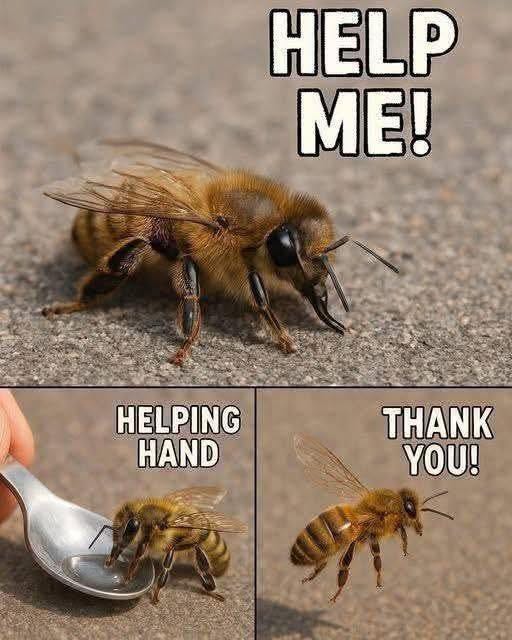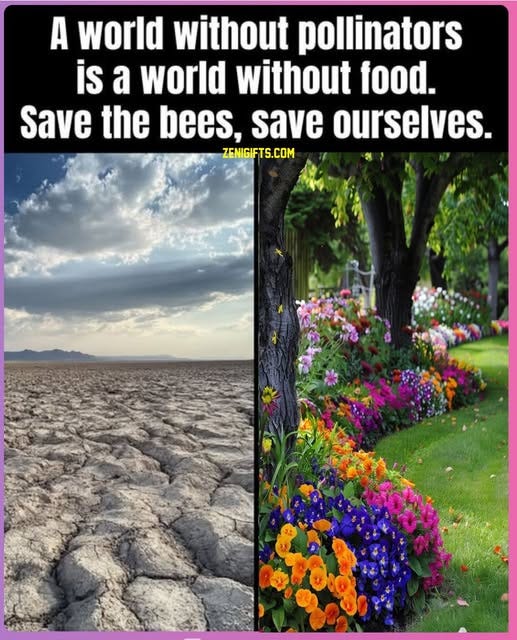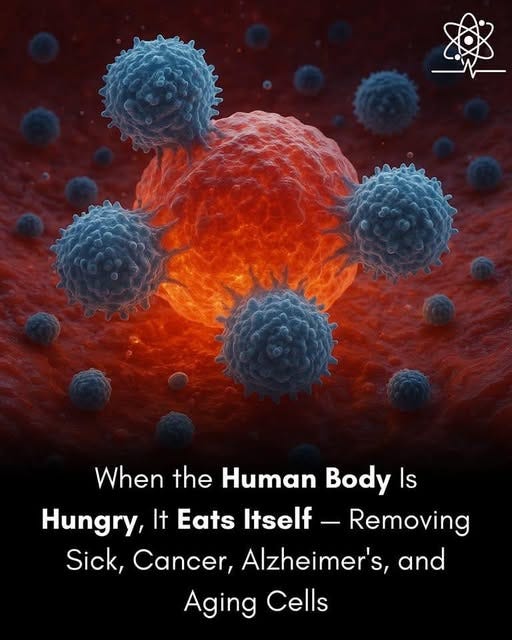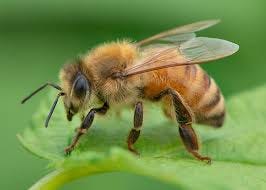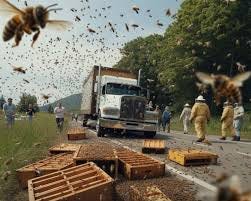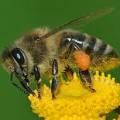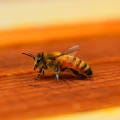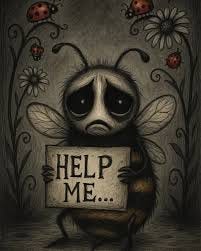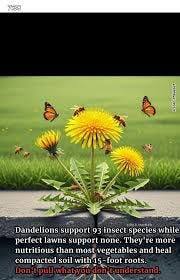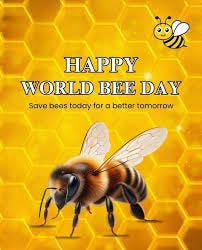SAVE OUR BEES!
HELP ME! A little sugar water will revive a Bee. See a Swarm. Call a beekeeper, not the Police or Fire Department. Or you will have DEAD BEES
Bees gather nectar from flowers, their first meal is a common Weed, we don’t like in our front yards, a Dandelion, then Clover as the Dandelion flowers die off. Remember blowing the puff balls after the Dandelion has finished blooming. I did it as a child, and it spread the seeds far and wide, just like the wind does.
While they are not the only pollinators, they give the most band for one of God’s tiny creatures. If you leave them alone, they will leave you alone.
David Attenborough Fan Lovers
When the human body is deprived of food for long enough—typically 14 to 24 hours—it enters a process called autophagy, which means “self-eating.”In this state, the body begins to break down and recycle old, damaged, or diseased cells, including those associated with aging, inflammation, and potentially even diseases such as cancer and Alzheimer's.
This natural detox and repair system helps clear out cellular waste, faulty proteins, and dead mitochondria, effectively cleaning the body from the inside out. It’s a biological survival mechanism that not only conserves energy but also renews tissues and strengthens immunity. Discovered by Japanese scientist Yoshinori Ohsumi, this process earned the 2016 Nobel Prize and has since become a growing field in health and longevity science. Occasional or intermittent fasting may boost this process, helping the body reset and rejuvenate—but it’s not suitable for everyone and should be approached with medical guidance.
Bees hide a surprising secret.
When a hive loses its queen—the only one capable of giving life to the colony and maintaining order in a perfectly organized society—all seems lost. Life in the hive slows down. Without new eggs, the future disappears. Within a few weeks, the colony is on the verge of extinction.
But bees don't panic. Nor do they wait for salvation from outside. With an extraordinary display of collective intelligence and deep instinct, they launch a spectacular emergency response that is hard to imagine in a world ruled by insects. Transformation begins with a simple but essential choice. Worker bees select some ordinary larvae—the very ones that would usually become ordinary workers. They are nothing special.
They were born no different. But now their fate changes completely. They are selected to receive a special diet: royal food, also known as royal jelly, a rare substance produced by nutritious bees rich in protein, vitamins, and bioactive compounds. It's royal food in the purest sense. This special food is rich in protein, vitamins, and other beneficial compounds, allowing larvae to develop into queens with significantly different life spans and roles within the hive.
The larva fed exclusively on this substance no longer follows the usual path. In just a few days, its body develops differently. The sheep are activated. The body becomes larger and stronger. Life expectancy is multiplied by almost twenty. It won't work. It will rule. It will not follow a routine. It will bring life.
◆ The queen isn't chosen based on genes. It's created. It's as if, in a human society, you could take an ordinary child and, with proper nutrition, the right environment, and necessary support, turn them into an extraordinary leader. Without genetic interventions. Without fireworks. Just thanks for the support and perspective.
A LEADER IS BORN OUT OF CRISIS
This metamorphosis doesn't just save the larva. It saves the entire colony. Once the new queen is ready, she takes over leadership of the hive, begins laying eggs, restores order, and begins a new collective life cycle. From the threat of extinction, the colony is reborn stronger, more organized, and more balanced.
A SILENT BUT PROFOUND LESSON
Bees show us, without words, that in moments of great crisis, what is needed is not despair, but clarity. A plan. The right choice. Care and guidance. In their world, no queen is born. It is nurtured. Nurtured. Guided. And perhaps, just as in the beehive, in life too, it doesn't matter who you are at the beginning, but rather what you receive, how you are cared for, and what decisions others make in difficult times. Because sometimes the strongest leaders are born in the most challenging moments.
The Guard Bee.
This bee isn’t collecting pollen. It’s on guard. Near the hive entrance, specialized honeybees stand watch. Their role isn’t passive. It’s tactical. When danger approaches—wasps, hornets, or even a human hand—they release an alarm pheromone.
One drop of chemical signal. And the entire hive reacts. The scent spreads through the air like a coded flare. It marks the threat, tells other bees where to strike, whom to follow, and what to ignore. Each guard’s signal fine-tunes the attack pattern.
Too many pheromones cause the colony to waste energy. Too few, and the queen is exposed. This isn’t random stinging; it’s chemical coordination, Defense by precision signaling. The bee doesn’t just fight, it communicates the exact coordinates of the threat. Before the first sting lands.
Early Friday morning in Whatcom County, Washington, a truck carrying over 70,000 pounds of honeybee hives flipped, releasing an estimated 250 million bees into the area. Authorities closed nearby roads and advised residents, especially those with bee sting allergies, to stay indoors.
Beekeepers from across the region responded quickly, trying to recover hives and settle the swarms. The cleanup could take up to two days, depending on how quickly the bees rejoin their colonies. This wasn’t just an inconvenience — it was a full-on environmental event. Considering how critical bees are to food production, should we be thinking more seriously about how these hives are transported? What do you think — is this just bad luck, or a sign we need better systems for moving vital pollinators?
It is essential to note that during the summer months, there are fewer flowers and other food sources for bees, which puts them at a disadvantage. Additionally, the water is scarce, and many bees drown when attempting to drink from the pools. A advice to help them is to grate an apple and put the pieces in a bowl with water. Thus, bees can obtain fruit sugars and drink water without risk of drowning, since they can perch on fruit pieces. Our bee populations are threatened, so it is vital to provide them with all possible support.
I will live for just 40 days.
I may be small, but my work once helped the world grow. I pollinated the flowers you love, the fruits you eat, the trees that clean your air. My wings carried life from one blossom to another, day after day, season after season. But now… we are vanishing.
Amazing Story :
The flowers are fewer. The fields are poisoned. The skies are silent. And with every bee that disappears, the Earth loses a little more of its heartbeat.
People say, “It’s just a bee.” But without us, there is no food. No color. No balance. Without us, the future fades. That’s why I’m reaching out to you—not with fear, but with hope. Please protect us. Protect the flowers. Protect the wild.
Support those who fight for nature. Share our story. Plant for us. Speak for us. Teach others that we matter. Because when you protect the bees, you also protect your future. Let’s bring life back—one garden, one flower, one act of kindness at a time.
HELP SAVE ME! PLANT MORE FLOWERS.

